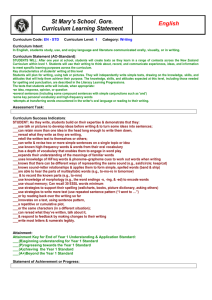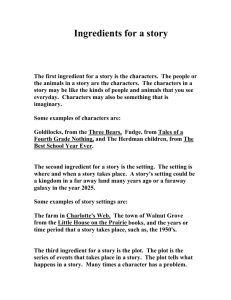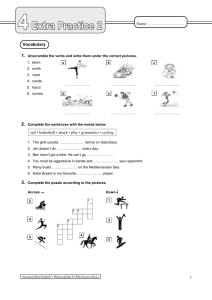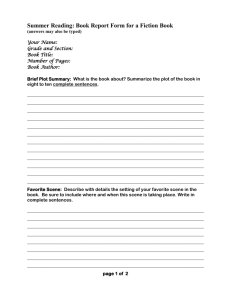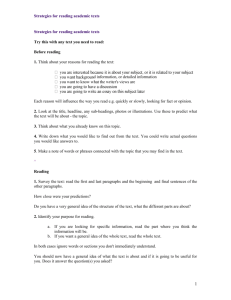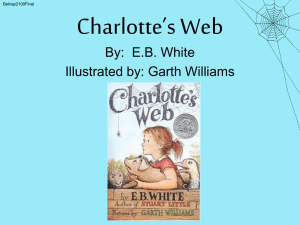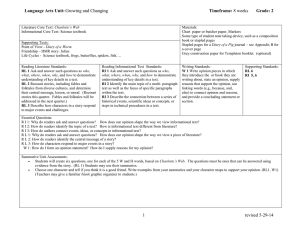Charlotte's Web UBD
advertisement
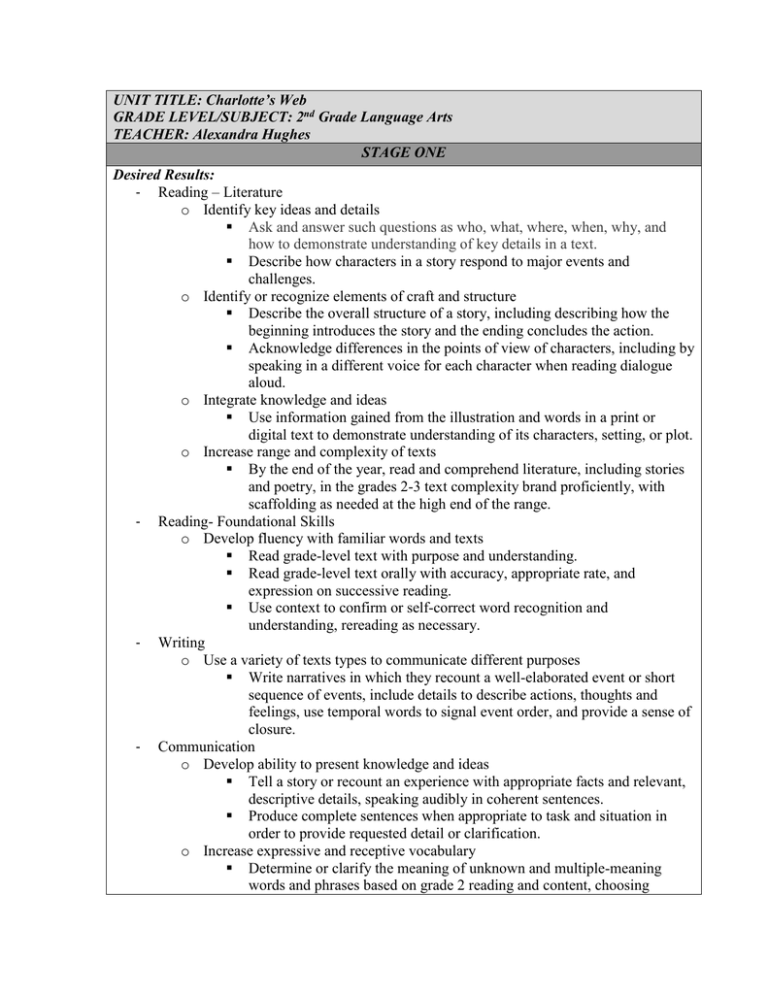
UNIT TITLE: Charlotte’s Web GRADE LEVEL/SUBJECT: 2nd Grade Language Arts TEACHER: Alexandra Hughes STAGE ONE Desired Results: - Reading – Literature o Identify key ideas and details Ask and answer such questions as who, what, where, when, why, and how to demonstrate understanding of key details in a text. Describe how characters in a story respond to major events and challenges. o Identify or recognize elements of craft and structure Describe the overall structure of a story, including describing how the beginning introduces the story and the ending concludes the action. Acknowledge differences in the points of view of characters, including by speaking in a different voice for each character when reading dialogue aloud. o Integrate knowledge and ideas Use information gained from the illustration and words in a print or digital text to demonstrate understanding of its characters, setting, or plot. o Increase range and complexity of texts By the end of the year, read and comprehend literature, including stories and poetry, in the grades 2-3 text complexity brand proficiently, with scaffolding as needed at the high end of the range. - Reading- Foundational Skills o Develop fluency with familiar words and texts Read grade-level text with purpose and understanding. Read grade-level text orally with accuracy, appropriate rate, and expression on successive reading. Use context to confirm or self-correct word recognition and understanding, rereading as necessary. - Writing o Use a variety of texts types to communicate different purposes Write narratives in which they recount a well-elaborated event or short sequence of events, include details to describe actions, thoughts and feelings, use temporal words to signal event order, and provide a sense of closure. - Communication o Develop ability to present knowledge and ideas Tell a story or recount an experience with appropriate facts and relevant, descriptive details, speaking audibly in coherent sentences. Produce complete sentences when appropriate to task and situation in order to provide requested detail or clarification. o Increase expressive and receptive vocabulary Determine or clarify the meaning of unknown and multiple-meaning words and phrases based on grade 2 reading and content, choosing - flexibility from an array of strategies. Demonstrate understanding of figurative language, word relationships, and nuances in word meanings. Use words and phrases acquired through conversations, reading and being read to, and responding to texts, including using adjectives and adverbs to describe (e.g., When other kids are happy that makes me happy). Collaboration and Reflection o Develop collaboration skills Participate in collaborative conversations with diverse partners about grade 2 topics and texts with peers and adults in small and larger groups. Recount or describe key ideas or details from a text read aloud or information presented orally or through other media. Ask and answer questions about what a speaker says in order to clarify comprehension, gather additional information, or deepen understanding of a topic or issue. Essential Questions: 1. What is friendship? 2. Why is friendship important? 3. How should humans interact with the natural world? 4. What is the importance of time? Knowledge: - The main theme of the book is the friendship between Charlotte and Wilbur. - Other themes are loyalty, the natural world, time, perseverance and death - When Wilbur wants to accomplish something he perseveres and does not give up - Friends are an important part of one’s life and can greatly enhance one’s experiences. Enduring Understandings: 1. Friendship is the close relationship between two beings and can exist between humans and animals. 2. Friendships are important for a persons well being. Friends support each other through both good and bad times and provide companionship. 3. The natural world is important because it is made up of all things not created by humans (plants, animals, and landscape) but that humans need to survive. Humans should treat the natural world with respect and admiration. 4. Time helps us structure our days but it is also something that we cannot control. Skills: - Explore and identify characters, setting, plot, and theme - Use text, images, and dialogue to reconstruct story events - Integrate the seven comprehension strategies from Mosaic of Thought (monitoring meaning, activating background knowledge and creating schema, questioning, inferring, using sensory and emotional images to deepen understanding, determining - - It is important to be loyal to your friends and family and to keep promises. Animals and humans all eventually die, it is a part of life Humans and animals should be treated with kindness The main characters are Wilbur, Charlotte, and Fern. The story takes place mainly on Zuckerman’s Farm although the Arable’s farm and the fair are other important settings Vocabulary: - Loyalty - Perseverance - Runt - Obliged - Adrift - Bandstand - Carousing - Crochet - Forlorn - Frolic - Gnaw - Gullible - Idiosyncrasy - Languish - Listless - Monotonous - Magnum Opus - Pummel - Sedentary - Slops - Untenable - - - - - - STAGE TWO importance, synthesizing) Recognize that there are multiple definitions of the same word Identify and organize details of a story both visually and verbally using a graphic organizer Define an adjective and pull examples of adjectives from the text Describe a character using adjectives Paraphrase the plot Make predictions about various outcomes Relate events in the story to events in one’s life and in other books Retell a sequence of events in order Compare and contrast the main characters in the story and connect them to student’s own experience Use learned vocabulary in sentences Make distinctions between the literal meaning and the interpretation of literature through small group discussions and writing Use strategies to interpret and comprehend text (reread the sentence, look at the picture, read the entire sentence and go back, start with the first sound and move on) Explore perspective by writing descriptive word lists from the point of view of a character Develop an understanding of life, death and the passing of time Write in complete sentences using part of the question in the answer as well as learned vocabulary words. Performance Assessments: - Orally answer comprehension questions about each chapter within a small group - Write complete sentences and paragraphs in response to reading that show an understanding of characters, setting and plot - Write complete sentences demonstrating understanding of learned vocabulary - Role play through Hot Seat (student’s put themselves into a character’s shoes and answer questions written by their peers) - Demonstrate understanding of the setting, characters, and story sequence through graphic organizers - Select a character in the book and write a descriptive paragraph using the new vocabulary words from this unit - With a cooperative group, create a script for the novel that includes the new vocabulary (with a rubric to define criteria) - Visualize and illustrate the Zuckerman’s barn from the description

